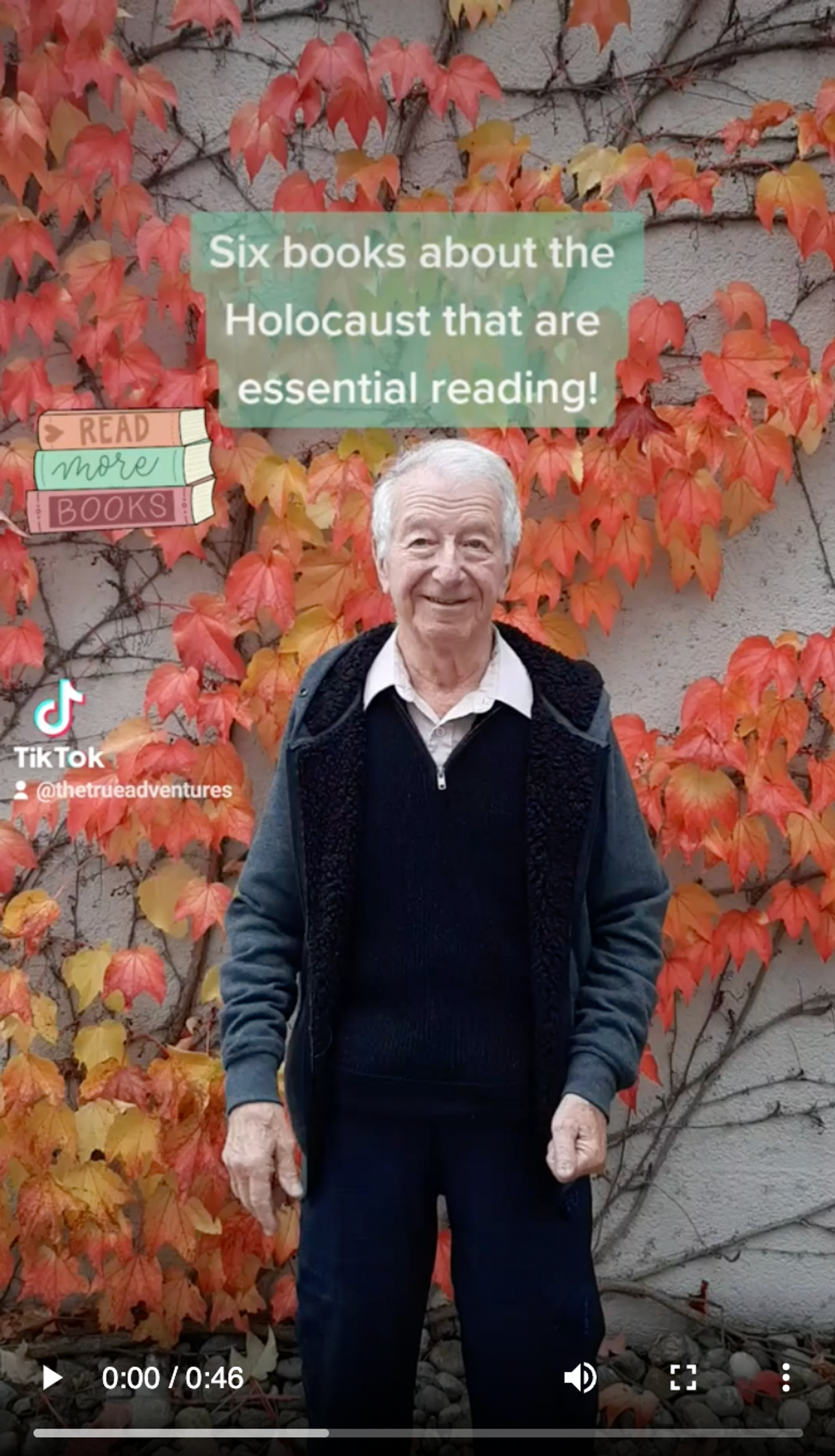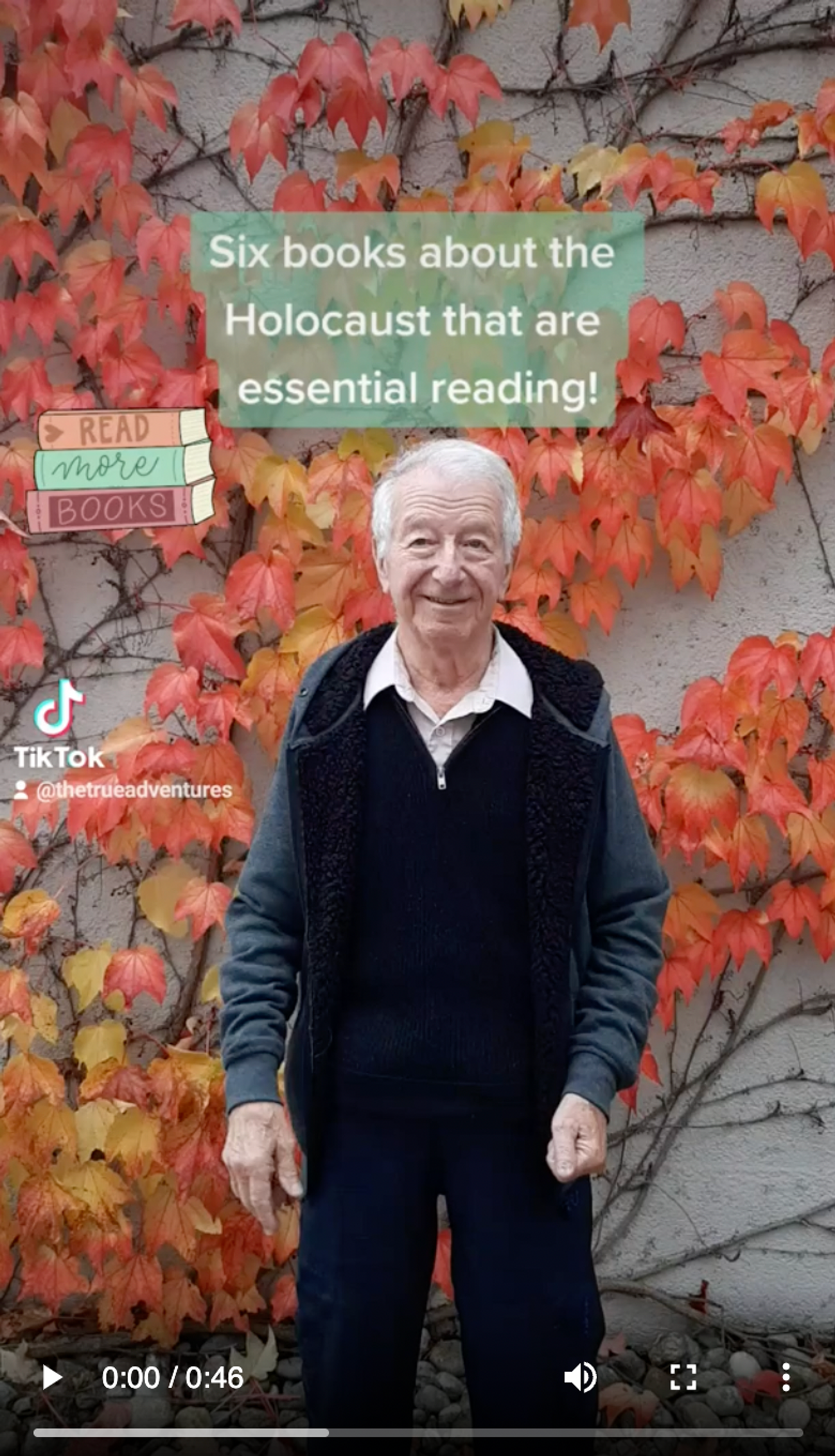Taking Holocaust Education to TikTok
A survivor uses his optimistic outlook—and his dancing skills—to entertain and teach, 30 seconds at a time




It’s not every day that a Holocaust survivor becomes a TikTok sensation. But Israeli Gidon Lev, who just turned 87, is a rapidly rising star of the video-focused social networking service, with almost 400,000 followers and 5.7 million likes. That is a lot of people—particularly young people, whose lack of knowledge about the Holocaust has made headlines lately—watching and liking his sometimes playful and other times serious and educational 30-second videos.
Lev, born in 1935 in the former Czechoslovakia, was imprisoned at age 6 in the Theresienstadt concentration camp, where he remained until he was 10. Almost all of the 150,000 children sent there were murdered at Auschwitz, Treblinka, and elsewhere; only 92, including Lev, survived. After losing 26 of his family members in the Holocaust, he came to Israel in 1959, fought in the Six-Day War, and married twice. He has six children and 14 grandchildren. In addition to the hardships imposed on him as a child by the Nazis—hunger, cold, insecurity, fear, unimaginable suffering and loss—Lev is also a two-time cancer survivor. But none of his life’s adversities have made him less spirited or optimistic. To the contrary: He loves to dance, is curious and feisty, and his resilient attitude is contagious, as is evident by how his enormous TikTok audience responds to his positivity, giving him the online nickname #tiktokgrandpa. “I always clung to life,” he said. “The thirst to hold on and to survive is part of my character.”
His rise to TikTok fame began with a different project. Julie Gray—a journalist, editor, and film industry veteran from LA who made aliyah in 2012—was originally approached by Lev, a widower, to edit his memoir. During their collaboration, a romantic relationship developed and they now call themselves “loving life buddies.” In 2020, they published a co-authored book titled The True Adventures of Gidon Lev: Rascal. Holocaust Survivor. Optimist. When they first launched their TikTok account—called @thetrueadventures—it was meant to promote the book. “What if I could totally subvert expectations—put an old man on a new platform?” Gray said in an interview with Haaretz.
Although the content created by Lev and Gray was first limited to snippets of information about Lev’s story as reflected in the biography, it soon became clear to them that they had a unique opportunity to educate. “The business of selling the book has become secondary for us,” said Lev, because as their following grew and they discovered how much misinformation, antisemitism, Holocaust-denying, and hatred fills the TikTok universe, they felt the need to engage. “The thing that vaulted us was the Holocaust comparisons to [COVID] vaccines,” said Gray. “We were tagged by a couple of big creators, and overnight it became our raison d’être.”
The TikTok account has seen steady growth, but there have been a few big jumps connected to a phenomenon emblematic to how TikTok works. One came when two of their TikToks challenged the infamously loudmouthed podcaster Joe Rogan over his racist comments, and it caught the attention of news outlets such as The Daily Dot, Newsweek, and the British Daily Sun, which all ran stories of how a Holocaust survivor took on the influential cultural commentator. As a result, people streamed to their TikTok account. “We are fighting hate against anything and everybody,” Lev noted. They actively seek to combat disinformation, prejudice, racism, hate, homophobia, Holocaust ignorance and denial, as well as anti-vaxers, but also promote tolerance, love, hope, and kindness with Lev’s unbeatable optimism.
In a recent video in response to the war in Ukraine, Lev performs a little tap dance while text appears on the screen in short fragments: “So much pain & war/and hurt and fear/not to mention TikTok feuds/it’s overwhelming/remember to do what you love/allow me to dance for you/things will get better/eventually/I promise.” If anyone can promise that life will get better from experience, it’s Lev. Since the Russian invasion, he has acted as someone putting things in perspective for followers who are worried. Comments such as “You made my day, I needed this” commonly appear on his videos.
Sometimes the pair does live sessions with an open forum for TikTokers to ask Lev questions directly. Gray says people are blown away by meeting a Holocaust survivor. But, due to the nature of the platform allowing anyone on TikTok to “enter” these sessions, they have to arrange to have five or six moderators on hand to block trolls intent on sabotaging sessions or diverting attention toward their own accounts, or to quickly delete antisemitic comments as they roll in. Despite the sometimes demoralizing amount of negativity they see, Lev and Gray choose to focus on the positive. They welcome and happily answer questions that to some may appear naïve: “Did you meet Anne Frank?” “Did you see Hitler?” “Did you go in a gas chamber?” “Where is your numbered tattoo?” They hold to the mantra that if their answer can help spread information about the Holocaust, it’s a good thing. “One of our highest moments,” Gray said, “is when a young TikToker tells Lev, who uses his first name Gidon for his TikTok persona, ‘Thank you for making me not feel stupid.’”
“I want to tell young people what it was like in the day-by-day struggles” during the war, said Lev, adding that his personal story is much more relatable to young people than history lessons, and can give them hope for the future.
Gray notes that a lot of their young followers have developed what she calls a parasocial relationship with #tiktokgrandpa. They spend hours daily responding to questions and comments to their videos. It’s impossible to acknowledge them all, as they often appear in the thousands, but curating the conversations has become part of the job. Lev and Gray’s engagement makes followers feel heard and seen, which only adds to the experience of connectivity and community.
Some educators turn to TikTok to find ways to engage their students, and Lev and Gray say that one of their most meaningful educational opportunities was a recent Zoom visit with a group of fourth graders from Rhode Island, most of whom were not Jewish. Following the virtual classroom experience, Lev received personal video greetings from all 24 students, thanking him. “What we see clearly through our impact on our young audience is that Holocaust education needs to evolve,” said Gray. Museums can be numbing, and seeing a dusty pile of shoes may offer a visual impact, but speaking directly to a survivor is a much more effective way to create a memorable experience of connecting to history. Gray says that the content they create on TikTok can be thought of as a new interactive wing to the history museum—except it’s not in the museum, but on your device.
Lev is not the only Holocaust survivor on TikTok. The first one to take to the platform was Lily Ebert, whose 19-year-old grandson creates the content that typically shows the impeccably dressed, 98-year-old Ebert seated and talking to the camera. She has amassed a huge following, but her content, like that of fellow TikTok survivors Tova Friedman and Rosie Greenstein (aka The Readahead of Auschwitz) does not have the variety and colorful playfulness of Lev’s videos, which may be one reason he has experienced such success in creating an engaged audience. Sometimes, @thetrueadventures performs what’s called “duets” with other content creators, such as @tovafriedman, which can help boost attention and attract followers for both parties.
In January 2022, Lev and Gray launched a podcast that they originally intended to be a fairly straightforward reading of their book. “We initially recorded it as an audiobook, with only the text reading, but then decided to take a chance and add music and FX [sound effects] so it was more immersive,” Gray told me. The result is a hybrid audiobook/podcast/serial that includes bonus material, real-time interjections and comments from Lev and Gray’s conversations, and sound effects blended in, like a sizzling skillet or steps on gravel or traffic in the background. Gray narrates, Lev reads some parts, and an Israeli actor reads the passages spoken by the young Gidon. The result is a vivid and varied way to tell the story in the book, as well as the story behind it.
Lev and Gray’s book, podcast, and TikTok point to the same goal: sharing Lev’s personal story with as many people as possible to educate and prevent misinformation about the Holocaust, while at the same time telling a story about resilience and the value of persistent belief in the possibility of a better future. In one of their TokToks that went viral, a bare-chested Lev smiles into the camera, Nico’s “These Days” plays in the background, and his hopeful words pass over the screen: “I have survived: a Nazi concentration camp, cancer, heartbreak, loss failure. You got this. I believe in you. Never lose hope.”
Nina Lichtenstein is a writer, teacher, and storyteller who divides her time between Maine and Tel Aviv.